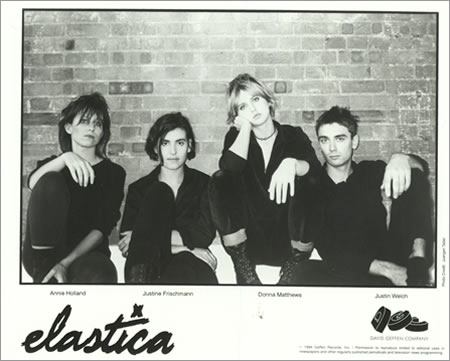Greetings, citizens of Bootleg City. It’s an honor being the first female interim mayor of this fair burg. But perhaps you’re wondering how I snagged this plush gig.
No no no, it’s nothing like that. Apparently I wowed Mayor Cass with my Material Issue-honoring radio show and my ability to speak fluent Genesis and anti-REO Speedwagon haikus. My impeccable harmonies during the Hall & Oates sing-along at the Popdose Christmas party likely didn’t hurt matters, either.
I’ll tell you, though — being this city’s first lady interim mayor is no easy task. Mayor Cass left his office a mess when he hightailed it out of town last month for his “vacation.” We’re talking crumpled, never-sent fan letters to Jon Anderson, a Time-Life collection of ’80s music gathering dust in the corner, and a dart-riddled photo of Matt Wardlaw behind the door. And his bathroom reading material — you don’t even want to know.
But I have big plans for the week that I’m in charge. Gigantic plans. Anyone who thinks government doesn’t move fast hasn’t met me. You see, this week I’m taking my inspiration from Britpop goddesses Elastica. Now, that was a band who knew how to pack a lot into a short amount of time.

Formed by ex-Suede members Justine Frischmann and Justin Welch, Elastica specialized in brief, spiky tunes indebted to postpunk, new wave, and no wave. In hindsight, the band was light years ahead of its time; its inspirations included Blondie, the Pretenders, the Fall, the Stranglers, and Wire, which weren’t de rigueur name drops until a decade later. (Wire actually sued Elastica — and won — because the British band’s megahit ”Connection” borrowed too much from Pink Flag’s ”Three Girl Rhumba.”) Sex, love, heartbreak, and ennui — these are the topics Elastica both fought against and romanticized.
Because it sounded so alien, Elastica’s 1995 self-titled debut was nothing short of a revelation for me. Purchased the same day as Echobelly’s Everyone’s Got One at the Best Buy in North Olmsted, Ohio, Elastica made my high school existence a bit less stifling. I practiced my Frischmann-like sneer in front of the mirror, dreamed up video treatments for ”Connection” during English class, and daydreamed about escaping vanilla suburbia. Everything in the glamorous, buzzed-up world of Britpop just seemed so much more interesting.
Looking back, I was clueless about how good I had it — PJ Harvey, BjÁ¶rk, Tori Amos, Juliana Hatfield, Liz Phair, Kay Hanley, Tanya Donnelly, and Kristin Hersh were all visible, viable, influential women in music (to say nothing of Courtney Love, who at the time was almost sane). I took for granted hearing Hole or Letters to Cleo on the radio next to the latest jam by Collective Soul, but nu-metal all but killed that equanimity in the late ’90s, at least where the mainstream is concerned. In the past decade, rock ‘n’ roll role models for girls have included Evanescence’s Amy Lee, that Flyleaf vocalist, Karen O, Paramore’s Hayley Williams, and … uh …
Sure, now I realize that these 90s women, despite being strong, tough, and capable, weren’t always treated with respect. (In England, Frischmann was a tabloid fixture, thanks to relationships with Suede’s Brett Anderson and Blur’s Damon Albarn.) But just the fact that Elastica existed — and that its fun and feminist tunes permeated my life — was a win as far as I was concerned.
The bootleg “The Vaseline Gang” compiles three different European shows from the band’s heyday. (This explains why listeners get three versions of the nuclear-punk spazz-out ”Connection.”) The first 14 tracks, which date from April 18, 1995, are downright ferocious. At that point, Elastica’s catalog consisted of a self-titled debut and a handful of singles and B-sides. In other words, there’s plenty of killer and no filler in these shows, including the bittersweet, methodical pop trudge ”Never Here”; the swirling, post-shoegaze gem ”Waking Up,” which I always considered a sonic cousin to the Pretenders’ ”Night in My Veins”; the clashing howl ”Stutter”; and the perforated, bass-heavy Blondie homage ”2:1.”
The middle of the boot is from ’94 and predates Elastica, which explains the inclusion of rarities like ”Spastica” (it later appeared on the soundtrack to The Craft) and the squiggly, slo-mo metal throwaway ”Rockunroll.” Both pale in comparison to the newer material, although the performances — a bit rougher and looser — presage the band’s evolution. Indeed, “The Vaseline Gang” overall shows the band at its loosest: Frischmann breaks a string, jubilantly calls out ”Cheers!” multiple times, and bashes through cheeky tunes (cf. the 90-second ”Annie”) with exuberance.
Like most good things about Britpop, Elastica’s high didn’t last. Countless lineup changes and drug problems plagued the band during the latter half of the 90s, and they didn’t release their second album, The Menace, until 2000. Elastica dissipated shortly thereafter.
Since then its members have scattered to various professions and countries, with a reunion looking about as likely as Morrissey and Marr patching things up. Most notably, Frischmann married a college professor last year; M.I.A., who took The Menace’s cover photograph and directed the video for “Mad Dog God Dam,” was a bridesmaid.
September 6, 1994
Spastica
Connection
Line Up
2:1 [Instrumental Version]
See That Animal
S.O.F.T.
Car Song
Rockunroll
Never Here
Stutter
April 7, 1995
Car Song
Connection
Line Up
April 18, 1995
Gloria
Rockunroll
Line Up
Annie
Car Song
Never Here
Stutter
2:1
See That Animal
Waking Up
S.O.F.T.
Connection
Blue
Vaseline




Comments